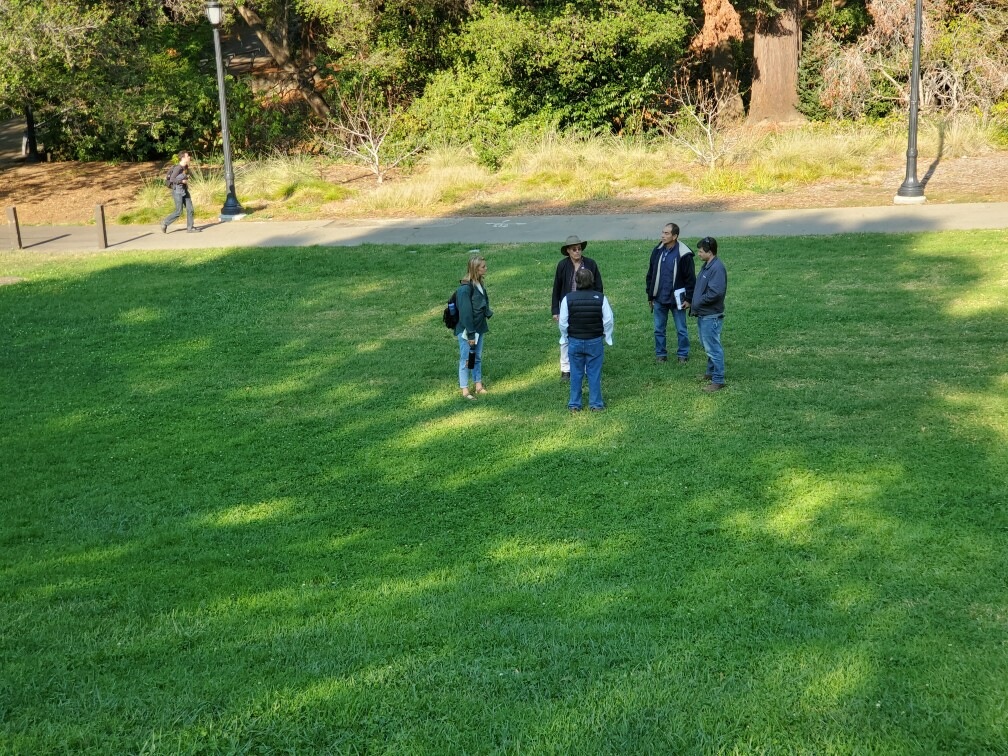23
Jan
University of California Makes Changes to Reduce Use of Toxic Pesticides, Fails to Embrace Organic

Photo: Beyond Pesticides’ board member Chip Osborne and student advocate Bridget Gustafson meet on a University of California organic land management pilot site, supported by Beyond Pesticides.
(Beyond Pesticides, January 23, 2020) University of California (UC) President Janet Napolitano recently has approved recommendations made by the UC Herbicide Task Force, a proposal that falls short of systems change that student activists are advocating. New changes will, however, restrict the use of some toxic pesticides and increase transparency across the university’s ten campuses. While the decision represents an important step forward, advocates remain critical of integrated pest management (IPM) policy and support an overall transition to organic land management. The UC Board of Regents will meet today to discuss the decision.
President Napolitano will continue the suspension of glyphosate, established last year, until a UC-wide integrated pest management (IPM) policy is implemented and all ten UC campus locations complete individual IPM plans. A system-wide “oversight committee” will guide and authorize school IPM committees. The overarching IPM policy will restrict application of highly toxic pesticides, only permitting use after a local IPM committee has reviewed and approved its specific use application following an IPM-based assessment. Other synthetic pesticides will be subject to limitations of use and review as determined by IPM committee. In addition, a pesticide use authorization software—a database for the application of herbicides that includes information such as what substance was sprayed, where it was sprayed, and when it was sprayed—will report campus pesticide usage.
Integrated pest management has been captured by the pesticide industry and misconstrued to permit the use of toxic pesticides, which are not permitted in an organic system. IPM traditionally permitted toxic pesticides only as a last resort, but industry influence has distorted the practice to place pesticide use on par with other pest management approaches, including mechanical, structural, cultural and biological controls. Organic land management, by contrast, takes a precautionary approach by focusing on soil health and only using a discrete list of least-toxic products that do not cause adverse effects and are compatible with soil biology.
The Herbicide-Free Campus organization is made up of student groups across the UC-system and the nation. Student advocates are motivated by concerns that exposure to toxic pesticides is linked to neurotoxic effects, respiratory illness, cancer, endocrine system disruption, and learning disabilities – all of which more potently affect frontline communities and people of color. Further, they are alarmed by the association between toxic pesticide use and devastating environmental threats, including the climate crisis, insect apocalypse, and dramatic biodiversity decline. Students are especially troubled about the continued use of fossil-fuel based pesticides and synthetic fertilizers in the face of the climate crisis and elevated levels of atmospheric carbon.
Herbicide-Free Campus recruited students across the UC-system, hosted educational events, organized over 15 weeding workdays with groundskeepers, met with UC Regents, and created herbicide-free resolutions through the Associated Students of the University of California. As a result of these efforts, President Napolitano temporarily banned glyphosate (Roundup) across the UC system last summer and established a task force to provide recommendations. The creation of the task force was catalyzed by lawsuits won against agrochemical manufacturer, Bayer’s Monsanto, by plaintiffs who developed cancer after exposure to the widely used weed killer Roundup (glyphosate).
“The task force has done a good job working within the system to develop recommendations for how the UC campuses can decrease their pesticide usage,” says Herbicide-Free Campus co-founder Bridget Gustafon, “However, these recommendations will be seen as a failure to me if the burden of the work from them falls onto the backs of the already overburdened, undercompensated landscape services folks, instead of creating a systemic, encompassing foundation for their work to stand on. So, may we, as students and countless activists have done before, pick up our shovels, open up our ears and eyes, and continue our grassroots efforts to hold this institution accountable for systematically and equitably implementing the task force’s recommendations.”
Student activists are asking UC to commit to transitioning to all organic land care maintenance on all University of California campuses by 2025. This could be an opportunity for the University of California, which prides itself on its commitment to sustainability, to join other universities such as Harvard, the University of Colorado at Boulder, Yale, University of Pennsylvania, and others as a national leader in the field. Beyond Pesticides is proud to support the efforts of these passionate student advocates.
Beyond Pesticides is working to transition land management to organic practices, which eliminate all toxic pesticides and synthetic fertilizers, at universities, school districts, parks departments and on town, city, and county lands throughout the U.S. Information on organic land management and organic-compatible products can be found on the Beyond Pesticides website. See our Tools for Change page, which includes model policies and ordinances. Email Beyond Pesticides at [email protected] for more information.
All unattributed positions and opinions in this piece are those of Beyond Pesticides.










